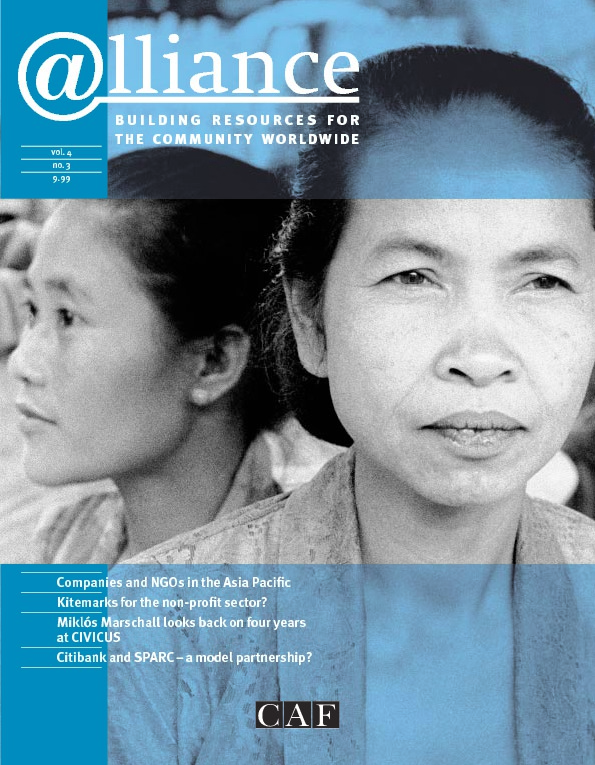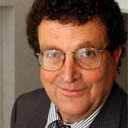To the question ‘Was it easy to establish CIVICUS?’ my answer is ‘Yes and no’. A good mix of naivete and idealism was certainly necessary. I am sure a thorough risk assessment would have killed the idea of CIVICUS. Had I known all the difficulties ahead, I would not have taken on the job of founding executive.
Fortunately, from time to time we manage to put aside these rational assessments and embark boldly upon new ventures. CIVICUS has definitely been one of them.
A triumphant optimism
In a way, creating CIVICUS was easy. In 1991, when the first formal meeting to discuss the idea of an ‘international something’ took place in Washington DC with about 20 participants from six continents, we were overwhelmed by triumphant optimism about global trends. Oppressive regimes had collapsed, the cold war bipolarity was disappearing, new freedoms were being granted to people all over the world, from the Philippines to Poland. This was the year when Fukuyama came out with his bestseller End of History.
Indeed, many of us believed we were entering a new era with a just and stable world order not so far away. For someone from ‘behind the iron curtain’ like myself, it was simply overwhelming to find oneself out in the open world participating in an unprecedented global conversation. There was hope in the air. Many of us – from countries like Brazil, the Philippines, Chile, South Africa and Hungary – were greatly uplifted intellectually as well as emotionally by the newly gained freedoms.
Impeccable timing
In retrospect, one can say the timing was impeccable. What was an early assessment of a few people in 1991 about the importance of citizen participation has since gained wide acceptance – among governments, multilateral agencies, development professionals, even financial institutions. CIVICUS was one of the first groups to put the concept of civil society on the global agenda.
The right founders
Key institutions and individuals were among the founders, including the two most important umbrella organizations of the US philanthropic community, Independent Sector and the Council on Foundations. The European Foundation Centre and its key members were also involved from the outset. Moreover, through the two US umbrellas, CIVICUS was fortunate to benefit from the organizational and political skills of two giants of the US non-profit sector, Brian O’Connell, then president of Independent Sector, and Jim Joseph, then president of the Council on Foundations. We had the crème of the philanthropic community with us.
The handful of civil society leaders who came together for the first meeting in 1991 represented a magic mix of diverse talents and backgrounds. In addition to key organizations and individuals from the North, we had brilliant and courageous leaders from the South: Miguel Darcy from Brazil, Rajesh Tandon from India, and Farida Allaghi from Saudi Arabia, to name a few. CIVICUS has been a true coalition from the outset: while Brian O’Connell and Jim Joseph gave CIVICUS weight in the grant-making community, these southern leaders assured us credibility in the NGO world.
A daunting job
On the other hand, creating CIVICUS – and, more importantly, keeping it alive – was a daunting job.
- Civil society was a wonderful, exciting idea, and promoting it was a noble ambition. We were all thrilled by the ‘associational revolution’. But translating our excitement and enthusiasm into practical actions and meaningful programmes was extremely difficult.
- Civil society was a complex political concept, maybe the most important one of our time. However, by its nature it lacked the compelling appeal of other issues like human rights, corruption or environmental pollution. In the era of soundbites, the hardest thing was to explain our mission and goals.
- Defining the added value of the new alliance was difficult. Many of the tasks we thought were important were already taken care of by others: specialized networks were already dealing with issues such as research on the third sector, legal and fiscal aspects of the non-profit world, voluntarism and corporate citizenship.
- Accommodation of diverse, sometimes divergent, political aspirations was an obstacle in producing a sharp, compelling mission statement.
- As with many new initiatives, it took us a while to learn our proper role as board member, executive or staff. The first board was made up of directors from 19 countries and six continents. No wonder some felt that they were ‘delegates’ of their region, owing loyalty to that region and not to CIVICUS.
A good start …
Despite the difficulties, CIVICUS made a great start. Regional reports were published taking stock of civil society developments in six continents. The global report Citizens: Strengthening global civil society was published. The introductory essay, written by Rajesh Tandon and Miguel Darcy, is still – many years later – one of the most eloquent pieces ever written about civil society.
To the surprise of some sceptics, the first CIVICUS Assembly in Mexico City in 1995 was a success. I will never forget the opening plenary with Ernesto Zedillo, the Mexican president, Rigoberta Menchu, an Indian woman from Guatemala, and David Rockefeller – the coming together of three worlds, three cultures, three sectors usually apart from one another. It was a forceful way to show what CIVICUS – World Alliance for Citizen Participation — was all about. We left Mexico City with the happy feeling that CIVICUS was indeed born!
Divisions on the board
However, the jubilation did not last long. Months later, the board was unable to reach any decisions about CIVICUS’s future programme. The board was divided along various lines:
- The minimalists did not want CIVICUS to be more than a loose network. They argued against formal membership, too ‘heavy’ programming, a strong and ‘expensive’ staff. The maximalists wanted to see more tangible membership services, technical assistance, and more concrete projects.
- The globalists thought CIVICUS’s real added value was its global nature, its ability to act as ‘a network of networks’ crossing sectoral, regional and cultural boundaries. The regionalists wanted a more decentralized operation. They saw any global emphasis as an attempt to dictate the CIVICUS agenda ‘from above’. For regionalists, the Washington-based secretariat was a threat rather than an asset to the organization.
As a result of these divisions, CIVICUS did not have an approved action plan for more than a year following the Mexico City Assembly. There was not much to communicate to the outside world.
Fortunately, with the help of some expert facilitation, we eventually managed to formulate a long-term strategy for the organization. The discussions had been healthy and useful. By early 1996, the long-awaited three special projects were launched (visibility of civil society, legal and regulatory issues, resource mobilization). CIVICUS reaffirmed its central role as a civil society resource organization and the strategic importance of formal membership in CIVICUS.
The three special projects resulted in four very well-received publications. The Second Assembly in Budapest in 1997 attracted 500 participants from 75 countries.
The right organizational structure
In the meantime, CIVICUS wanted an organizational structure that matched our mission better. Three options were considered:
- the corporate model, which is very much a product-driven, entrepreneurial model;
- the federational or alliance model, which emphasizes participation and representation;
- the membership associational model, which focuses on servicing functions.
The model the board finally opted for was closest to the federational model, with an emphasis on expanding CIVICUS outreach in the regions.
Choices ahead
In 1994, when I joined CIVICUS as its first executive director, it was a promising endeavour. In 1998, when I left CIVICUS, it was a successful organization with solid credibility. It was wonderful to be one of the architects of a timely global initiative.
But CIVICUS has always been a work in progress, and this is no less true now than in the early years. The real challenge at this point is deciding whether CIVICUS should be a global movement or a civil society resource organization, a repository of information and know-how.
The former has clear advantages in terms of greater visibility for the organization and more popular appeal but it also carries real risks for CIVICUS – primarily the risk to its credibility, of not being able to deliver on the issues, of failing to add to the causes it champions. I am confident my brilliant successor, Kumi Naidoo, and the board will hit upon the perfect combination of the two.
Miklós Marschall was involved in CIVICUS from the very beginning; he was executive director from 1994 to 1998. He is now Executive Director for East and Central Europe at Transparency International, based in Berlin. He can be contacted at marschall@compuserve.com
Civil Society Enhancement Award
In June this year the International Center for Not-for-Profit Law awarded Miklós Marschall their first ‘Civil Society Enhancement Award’ for his accomplishments in promoting civil society around the world. Presenting the award, Brian O’Connell stated: ‘I can scarcely think of anyone more deserving of this award than Miklós.’



Comments (1)
Thank you very much for this article about the historical birth of Civicus. I have been fortunate to be among the founders.It was a very rich and joyful journey. I am happy to see the Global network of Civicus so effective, and the great achievements of very important projects with civil society organizations making a difference in people’s life. I contributed to the establishment of several foundations, civil networks and NGO during the last thirty years of my career both Internationally and in the Arab region. I have to admit the Civicus is rated the best up to now . I hope to connect with Civicus again and empower the new generations of the Arab World to be part of it . Congratulations and keep the good work. Farida Allaghi Farida.Allaghi@gmail.com +961-3436161